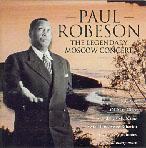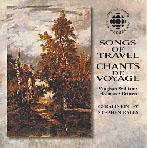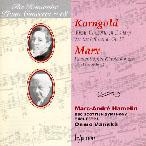|
Disques du mois /
Discs of the
month
- Paul Robeson: The Legendary Moscow
Concert
- Paul Robeson, baritone
- Alexander Yeroklin, piano
- (Russian Revelation RV 70004 /
Pelleas)
 This fascinating
release comes just in time for the centenary of Robeson’s birth on
April 8, 1998. The tape of this historic and controversial June 14,
1949 Moscow recital, one of the most politically significant
artistic events of our time, has only recently come to light. On the
eve of this recital Paul Robeson met with the Jewish poet Itzik
Feffer, who had been parolled from Lubyanka prison for the occasion.
Feffer secretly told Robeson that their mutual friend the
actor-director Solomon Mikhoels had been brutally murdered on
Stalin’s orders on Jan. 13, 1948, and that Feffer was in danger.
Robeson decided to try to protect Feffer by mentioning him at the
end of his concert. Before the terrified audience Robeson spoke of
the friendship between American and Soviet Jews, of the tragic death
of Mikhoels and of his good friend Feffer. There was a certain
amount of brave applause and then Robeson sang the Song of the
Warsaw Getto Rebellion which he had learned in Poland just a
month earlier. On this compact disc you won’t hear Robeson’s
pro-Jewish speech, just the "snip" of Stalin’s censors. (Feffer was
shot 3 years later). The rest of the program consists of Robeson
favourites like "Oh, No John No", "Swing Low Sweet Chariot" and "Ol’
Man River", charmingly introduced by a Soviet compère. Robeson acts
out "Water Boy" with terrifying gasps of exertion; the Soviet
audience encores both it and the labour anthem "Joe Hill". Robeson
sang all these songs a decade earlier with a fresher voice but he
never sang them with such bitterweet commitment. Truly a revelation. This fascinating
release comes just in time for the centenary of Robeson’s birth on
April 8, 1998. The tape of this historic and controversial June 14,
1949 Moscow recital, one of the most politically significant
artistic events of our time, has only recently come to light. On the
eve of this recital Paul Robeson met with the Jewish poet Itzik
Feffer, who had been parolled from Lubyanka prison for the occasion.
Feffer secretly told Robeson that their mutual friend the
actor-director Solomon Mikhoels had been brutally murdered on
Stalin’s orders on Jan. 13, 1948, and that Feffer was in danger.
Robeson decided to try to protect Feffer by mentioning him at the
end of his concert. Before the terrified audience Robeson spoke of
the friendship between American and Soviet Jews, of the tragic death
of Mikhoels and of his good friend Feffer. There was a certain
amount of brave applause and then Robeson sang the Song of the
Warsaw Getto Rebellion which he had learned in Poland just a
month earlier. On this compact disc you won’t hear Robeson’s
pro-Jewish speech, just the "snip" of Stalin’s censors. (Feffer was
shot 3 years later). The rest of the program consists of Robeson
favourites like "Oh, No John No", "Swing Low Sweet Chariot" and "Ol’
Man River", charmingly introduced by a Soviet compère. Robeson acts
out "Water Boy" with terrifying gasps of exertion; the Soviet
audience encores both it and the labour anthem "Joe Hill". Robeson
sang all these songs a decade earlier with a fresher voice but he
never sang them with such bitterweet commitment. Truly a revelation.
- Songs Of Travel: Vaughan
Williams, Holman, Britten
- Gerald Finley, baritone. Stephen Ralls,
piano.
- (CBC MVCD 1115)
 Gerald Finley’s debut album confirms him as
one of Canada’s greatest singers. The talented 38-year old baritone
who recently made his Metropolitan Opera debut as Papageno is here
revealed as a consummate interpreter of English art song - not
surprising since he has pursued his career in England for the last
decade. Finley’s smooth rich lyric baritone is straight and clean
with a warm timbre that touches the heart. He brings an intimate
domesticity to Vaughan Williams’ pastoral songs, though he could
have unbuttoned a bit more in Britten’s Folksong arrangements. The
obligatory Canadian content is Derek Holman’s song cycle The
Centered Passion (1986), a bleak excursion through Tennyson’s
In Memoriam. I would rather have heard Finley sing Schubert,
Schumann, Fauré or Duparc. Ralls’ discreet and tasteful
accompaniment crowns this charming album. Gerald Finley’s debut album confirms him as
one of Canada’s greatest singers. The talented 38-year old baritone
who recently made his Metropolitan Opera debut as Papageno is here
revealed as a consummate interpreter of English art song - not
surprising since he has pursued his career in England for the last
decade. Finley’s smooth rich lyric baritone is straight and clean
with a warm timbre that touches the heart. He brings an intimate
domesticity to Vaughan Williams’ pastoral songs, though he could
have unbuttoned a bit more in Britten’s Folksong arrangements. The
obligatory Canadian content is Derek Holman’s song cycle The
Centered Passion (1986), a bleak excursion through Tennyson’s
In Memoriam. I would rather have heard Finley sing Schubert,
Schumann, Fauré or Duparc. Ralls’ discreet and tasteful
accompaniment crowns this charming album.
- Joseph Marx: Romantic Piano Concerto
- Erich Korngold: Piano Concerto For the
Left Hand
- Marc-André Hamelin, piano
- Osmo Vänskä / BBC Scottish Symphony
Orchestra
- (Hyperion CDA 66990 / SRI)
 Hyperion’s Romantic
Piano Concerto Series serves up two fabulous keyboard confections.
Marx’s Concerto (1918) was apparently popular in the
German-speaking world during the ‘20s then faded from the
repertoire. The outer movements are spread over acres of lush creamy
Straussian orchestration, a rainbow of harmonies, jazzy and
fulgurous chords reminiscent of Rachmaninov. The inner movement is a
blatantly Tchaikovskian pastorale peppered with Scriabinisms.
Korngold’s Left Hand Concerto was commissioned by Paul
Wittgenstein in1922 when Korngold was Germany’s most performed
composer after Richard Strauss. This concerto is a meandering
symphonic poem full of balletic pictorial effects that anticipate
Korngold’s later movie music. The dramatic elements which led Gary
Graffman to call the concerto a "keyboard Salomé" veer between
Wagnerian schmaltz and bittersweet Wozzeckian angst. Marc-André
Hamelin is master of these decadent and eccentric scores which,
unlike many previous concertos in Hyperion’s series, beg to be
listened to again and again. The orchestral playing, conducting and
recorded sound are superb. Hyperion’s Romantic
Piano Concerto Series serves up two fabulous keyboard confections.
Marx’s Concerto (1918) was apparently popular in the
German-speaking world during the ‘20s then faded from the
repertoire. The outer movements are spread over acres of lush creamy
Straussian orchestration, a rainbow of harmonies, jazzy and
fulgurous chords reminiscent of Rachmaninov. The inner movement is a
blatantly Tchaikovskian pastorale peppered with Scriabinisms.
Korngold’s Left Hand Concerto was commissioned by Paul
Wittgenstein in1922 when Korngold was Germany’s most performed
composer after Richard Strauss. This concerto is a meandering
symphonic poem full of balletic pictorial effects that anticipate
Korngold’s later movie music. The dramatic elements which led Gary
Graffman to call the concerto a "keyboard Salomé" veer between
Wagnerian schmaltz and bittersweet Wozzeckian angst. Marc-André
Hamelin is master of these decadent and eccentric scores which,
unlike many previous concertos in Hyperion’s series, beg to be
listened to again and again. The orchestral playing, conducting and
recorded sound are superb.
|


